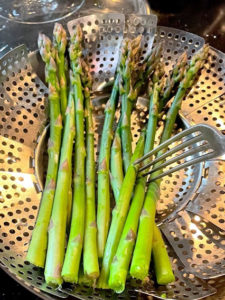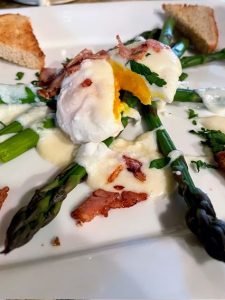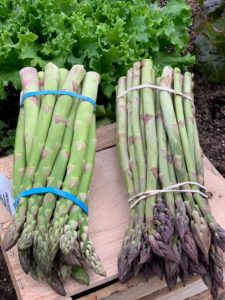spear some asparagus
spear some asparagus
Asparagus is a nutrient-dense perennial vegetable and a member of the lily family. It is only harvested during spring months in our area, so when it’s available be sure not miss the chance to savor some of these tender veggies. Remember that eating in season and eating local is more sustainable and tastes best! We… Read More »

Asparagus provides a dense supply of nutrients including potassium, fiber, thiamin, and vitamin B6 to help you keep going. Asparagus is one of the foods highest in prebiotic fiber known to benefit gut health and low on the glycemic scale. Enjoy asparagus in salads, soups, quiche, or roasted. Jenn Borealo, our culinary specialist, provided a simple and tasty recipe using asparagus: Asparagus Eggs Mornay. Enjoying tender asparagus with the fluffy texture of eggs is the perfect combination. There are a variety of other recipes featuring our homegrown asparagus available on our website for you to try such as; asparagus and pancetta strata or asparagus pizza.
Asparagus is a dioecious plant meaning it contains both male and female plants and in order to reproduce it must be near a female plant so
Our asparagus plants start out as crowns, which are the one year old root of asparagus. We use this method rather than planting seed to allow us to produce an edible crop within the first year or two of growing. We allow these plants to get established for the first couple of seasons so that we can ensure a successful crop for the future. Some asparagus beds have been known to produce vegetables for up to 10- 20 years so it is worth it to allow this crop to develop in it’s own timing. At harvest time, our production team will be reviewing the crop in the fields every couple of days as it spears could develop as quickly as that. The production team will begin to harvest when the spears reach 8-10 inches in height and the diameter of a pencil where they will be harvested all spring.
If you visit our farm this Summer you may notice we keep the remaining ferns in our asparagus bed intact after our Spring harvest. This allows the ferns to replenish the nutrients for next season’s production. We will eventually cut back the foliage in early winter, most times after the first hard frost.

Sustainability is important to us on our farm and we utilize many farming practices that promote healthy soil that ultimately improves the nutritional value of your produce. We use cover crops to restore soil nutrients, practice soil & water conservation as well as utilize integrated pest management. All of these practices help to ensure nutrient dense soil which makes for healthier produce and better nutrition. Our farm invites guests to our farm to learn how food is grown and to pick your own produce. Growing healthy food and feeding families is what we are all about and we feel we are blessed to be able to take care of the land with our sustainable stewardship.
Want to learn more about asparagus? Check out this other blog on our website.
Best wishes from our farm kitchen to yours. xo







